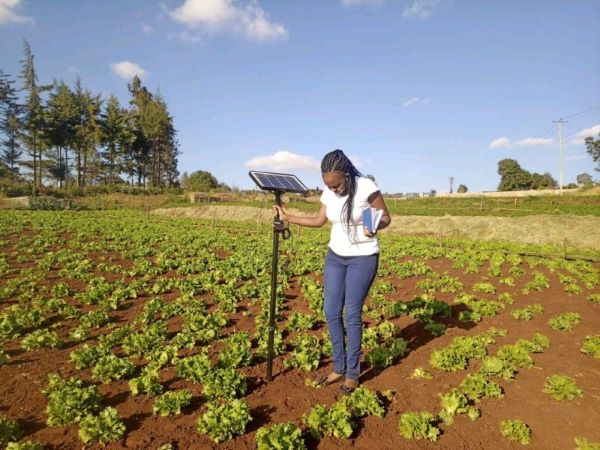After working in banking sector for some time, Maryanne Gichanga, a young Kenyan agripreneuer decided to venture in agritech two years ago by creating a technology that enables farmers detect pests and diseases and employ the counter mechanisms to boost crop yields.
According to the 33-year-old entrepreneur, the technology employs the use of data analytics to enable farmers, especially smallholders, to precisely detect pests, and know the accurate amount of chemicals and input to use further cutting costs of production and increasing yields.
“We came up with a technology that helps farmers detect pests and diseases early enough and advise them on the inputs, chemicals to use, prices, and exact location of the farm via their mobile phones,” said Gichanga who quit a stable job to tap into the immense opportunities that lie in precision agriculture.
She has since founded AgriTech Analytics, a start-up that is involved in collecting and analysing data to give farmers the ability to more effectively use crop inputs including fertilisers, pesticides, tillage and irrigation water through precision agriculture.
How she started AgriTech Analytics
It has not been easy. Gichanga says she has had to start AgriTech Analytics from her savings despite being faced with high initial investment costs initially because the innovation relies heavily on technology, which is expensive to acquire and implement.
“The other high cost is data collection and analysis because for our technology to succeed, a significant amount of data needs to be collected and analysed and this requires specialised skills and equipment that may be difficult to acquire,” she said.
Agri-techs, seen as the solution to boost food production in Kenya, are also costly to start and the start-up is now trying to catch the eye of equity financiers who are yet to understand precision agriculture.
“Equity financiers are yet to understand the precision agriculture industry, thus reluctant to commit. We plan to raise capital through equity and debt financing, crowdfunding, revenues, and grants even though we lack collaterals for loans,” said Gichanga.
Achievements and challenges
The innovation which has since received local and global recognition has already registered 3,880 farmers in Uasin Gishu, Nyandarua, and Kiambu counties in Kenya.
“We emerged top in the COP27 Youth Adaptation Challenge in Egypt and were awarded the best in Africa, a competition that was funded by African Development Bank and Global Climate Adaption,” says Ms Gichanga.
However, unlike some African agri-tech start-ups that have attracted lots of funding and picked up fast, hers has not been a smooth path.
Another challenge is the adoption and integration of the innovation because the uptake of precision agriculture may be slow, and integrating it into existing farming practices has not been easy.
Also, rural farmers who are the target users have limited exposure to technology which made adoption slow in the initial phases of roll-out.
“Since our technology relies on internet connectivity and related infrastructure, which may not be available in some remote areas, this proved problematic too,” said Gichanga.
However, the techpreneur has opted for a partnership model with other organisations to share costs and hire specialists besides resorting to revenue-sharing agreements with farmers to counter the challenges.









